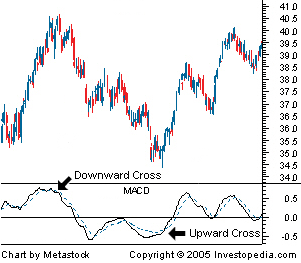
What is it?
The Moving Average Convergence Divergence, also known as MACD, is a trend following and momentum indicator that is based on the relationship between two moving averages.
How is it calculated?
It is calculared by substracting the 26 day Exponential Moving Average (EMA) from the 12 day EMA and plotting it, that's the MACD; then another 9 day EMA is plotted and it is called the signal line.How to use it:
There are three common methods used to interpret the MACD:1. Crossovers - As shown in the chart, when the MACD falls below the signal line, it is a bearish signal, which indicates that it may be time to sell. Conversely, when the MACD rises above the signal line, the indicator gives a bullish signal, which suggests that the price of the asset is likely to experience upward momentum. Many traders wait for a confirmed cross above the signal line before entering into a position to avoid getting getting "faked out" or entering into a position too early, as shown by the first arrow.
2. Divergence - When the security price diverges from the MACD. It signals the end of the current trend.
3. Dramatic rise - When the MACD rises dramatically - that is, the shorter moving average pulls away from the longer-term moving average - it is a signal that the security is overbought and will soon return to normal levels.
Variants
The HistogramSometimes you will have the option to plot the MACD histogram. This is a series of bars that show the distance between the MACD and the signal line.

The histogram works as an early indicator for the trend change. When the histrogram's slope changes direction it is signaling a decrease on the trend momentum and then a probable trend change.
Different values
Some people like to change the MACD default values to better suit their trading style. One popular set of values is 13 for the long term EMA, 6 for the short term and 5 for the signal line.
This will make the MACD more responsive to price movements and it's useful when trading shorter timeframes.











